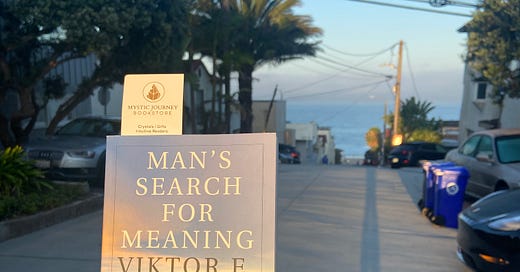Some things are in our control, while others are not
Last weekend I went to a film showing at a hard kombucha bar. Around 9:30, I felt pretty tired, but I couldn't leave without my friends as the designated driver. So, to get my energy back, I went for a walk when I stumbled into the "Mystic Journey Bookstore" on Main St in Santa Monica.
After discussing her energy crystals and other spiritual gadgets with Yasmin, the tattooed shopkeeper, I asked her what book had inspired her love for reading. She recommended "Man's Search for Meaning" by Viktor Frankl, and because Tim Ferriss had endorsed it as well, I bought the book on the spot and returned to the bar book in hand.
By the time we left the bar, I was about a dozen pages in, and I devoured the remaining pages in a couple of days. "Man's Search for Meaning" is Frankl's memoir and reflection on his time as an Auschwitz inmate. Frankl, a trained Jewish-Vienese-Psychiatrist, essentially tries to answer, where does man find meaning despite suffering?
Frankl's Three Avenues Towards Meaning
1. By creating a work or doing a deed
This is the most obvious and can be expressed through a fulfilling career or working on a start-up or creative endeavor.
2. By experiencing something or encountering someone
This he describes as truly loving someone and through loving them seeing their potential and helping to bring it forth into the world.
Or through experiencing beauty through art and music
3. By the attitude we take toward unavoidable suffering
Frankl is careful to mention, if suffering is avoidable, it should be avoided, but in the end, some aspects of suffering, such as death and deterioration, are unavoidable. Thus, it is through unavoidable suffering which we embrace with courage where we can find meaning.
A Life's Work
Frankl began working on the problem of meaning well before the holocaust through his brand of psychotherapy, logotherapy, which in a nutshell aims to help patients find meaning in life. In fact, he arrived at Auschwitz with his manuscript on logotherapy and mentioned his desire to recreate his work sustained him with intense purpose throughout the dehumanizing experience in camp.
Gott ist Tot
Further, Frankl identified what he called an "existential vacuum" for the modern human. Echoing the message of Nietzsche, who observed "Gott ist tot" (God is dead), Frankl believed that without religion, the individual must now discover and assign meaning to his own existence. Some may rejoice in freedom from the constricting force of religion, but without the buttress of tradition to show us the ropes, we face enormous responsibility.
Transitioning to Stoicism
A second notable aspect of Frankl's book is his ultimate conclusion's uncanny resemblance to Stoic philosophy. What is Stoicism? In its most basic essence, Stoicism trains us to separate what is in our control from what is out of our control and focus on improving the former while willingly accepting the latter (including death). I will include a link to a more detailed explanation below.
Here is Frankl's final conclusion after witnessing some of his typhus infected inmates give away their last rations of bread to their less able comrades:
"Everything can be taken from a man but one thing: the last of human freedoms—to choose one's attitude in any given set of circumstances, to choose one's own way."
— Viktor Frankl
Now, here are some Stoic quotes which emphasize this same point:
"A podium and a prison is each a place, one high and the other low, but in either place your freedom of choice can be maintained if you so wish
— Epictetus
"You shouldn't give circumstances the power to rouse anger, for they don't care at all."
— Marcus Aurelius
"You have power over your mind – not outside events. Realise this, and you will find strength."
— Marcus Aurelius.
"Some things are in our control, while others are not. We control our opinion, choice, desire, aversion, and, in a word, everything of our own doing. We don't control our body, property, reputation, position, and in a word, everything not of our own doing.
— Epictetus
"It isn't events themselves that disturb people, but only their judgements about them."
— Epictetus
"No person has the power to have everything they want, but it is in their power not to want what they don't have, and to cheerfully put to good use what they do have."
— Seneca
"Keep in mind that it isn't the one who has it in for you and takes a swipe that harms you, but rather the harm comes from your own belief about the abuse."
— Epictetus
"Do away with the opinion I am harmed, and the harm is cast away too. Do away with being harmed, and harm disappears."
— Marcus Aurelius
In Conclusion
"Man's Search for Meaning" teaches us the value of strong purpose in the face of suffering. Further, its uncanny resemblance to Stoicism highlights the modern applicability of the 2000-year-old philosophy. There is much power in the words, "Some things are in our control, while others are not."
Question:
What uncontrollable aspect of your life have you been spending too much time on?
P.S.
The Daily Stoic, "What is Stoicism": https://dailystoic.com/what-is-stoicism-a-definition-3-stoic-exercises-to-get-you-started/






